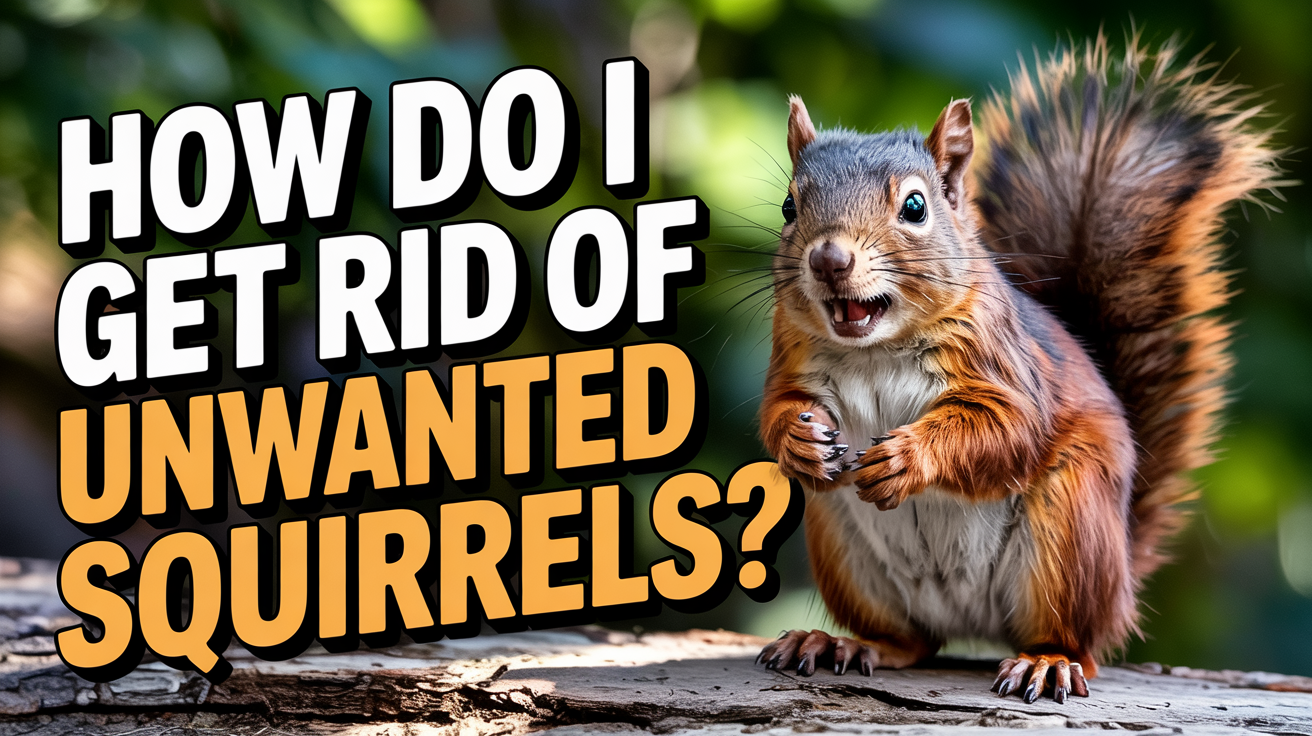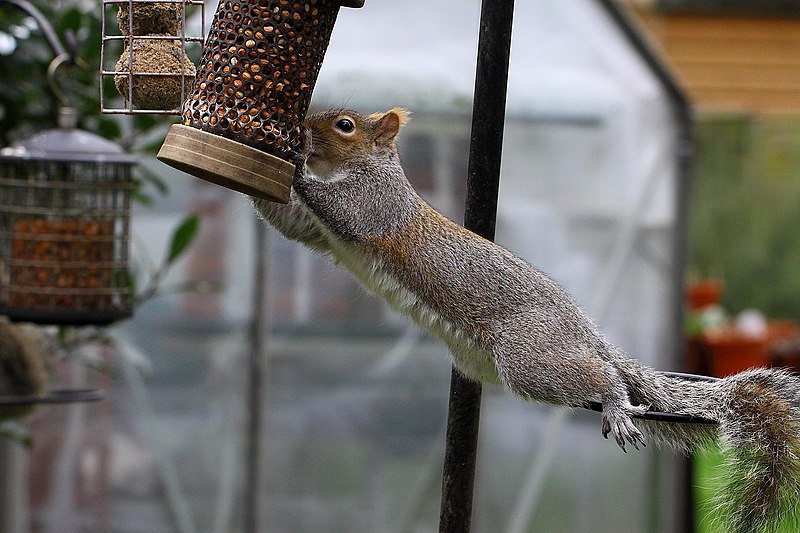“To get rid of unwanted squirrels, start by sealing off entry points and removing food sources around your home. Combine humane traps with natural repellents to safely clear them out and keep them from coming back.”
Squirrels may seem cute, but when they invade your home or garden, they can quickly become a nuisance. From chewing through wires to nesting in your attic, these crafty creatures can cause significant damage if left unchecked.
Removing squirrels from your property requires a combination of effective prevention techniques and humane removal methods. While some homeowners attempt DIY solutions, professional squirrel removal services are often the safest and most reliable option. In this guide, we’ll explore the best ways to get rid of unwanted squirrels and prevent them from returning.
Signs of a Squirrel Infestation
Noises and Physical Evidence
One of the most common signs of a squirrel infestation is hearing scratching, scampering, or rustling noises in your walls or attic. These sounds are typically more noticeable early in the morning or late in the afternoon when squirrels are most active. In addition to the noise, you might also spot signs of chewing on wires, wood, or insulation. Squirrels are notorious for gnawing to keep their teeth sharp, and this behavior can lead to significant structural damage.
Physical evidence of squirrels also includes droppings or nests made of twigs, leaves, and other debris in hidden corners of your home. You may also see paw prints around your property or small entry holes in your roof or siding where squirrels have found their way inside. Catching these signs early is essential to prevent the infestation from growing out of control.
Damage to Garden and Landscaping
Squirrels can wreak havoc on your garden and landscaping by digging up bulbs, eating fruits, and chewing on tree bark. If you notice shallow holes in your yard, gnawed plants, or missing vegetables, there’s a good chance squirrels are responsible. They often bury food like nuts and seeds in gardens or flower beds, which can disrupt your plants and ruin your carefully maintained landscape.
Additionally, squirrels may strip bark from trees, especially young ones, which can lead to the trees’ weakened health or even death. The damage they cause is not only unsightly but can also be costly to repair. Knowing the signs of their presence outdoors is just as important as spotting them indoors, as early intervention can save both your property and your garden from further destruction.
Steps to Get Rid of Squirrels
Step 1: Seal Off Entry Points
The first and most important step in getting rid of squirrels is to locate and seal off any entry points they are using to get inside your home. Inspect areas like your roof, attic vents, and gaps around windows or doors for signs of damage or openings. Squirrels are agile climbers and can fit through surprisingly small holes, so make sure to cover even the smallest gaps with durable materials such as metal flashing or wire mesh. This prevents new squirrels from entering and locks out the ones already inside.
Step 2: Set Humane Traps
Once you’ve sealed the entry points, it’s time to focus on removing any squirrels trapped inside. The most effective way to do this is by using humane traps, which allow you to catch the squirrels without harming them. Place these traps near the areas where you’ve noticed the most activity, such as in attics or near nesting sites. Bait the traps with foods squirrels love, such as peanut butter or nuts, and check them regularly. Once caught, you can safely relocate the squirrels far enough away so they won’t return.
Step 3: Use Squirrel Repellents
In addition to sealing entry points and setting traps, using squirrel repellents can help discourage them from coming back. Natural repellents like peppermint oil, vinegar, or predator urine can be effective when applied around your home’s perimeter, garden, and entry points. There are also commercially available sprays that can deter squirrels with unpleasant odors or tastes. Reapply these repellents regularly, especially after rain, to maintain their effectiveness.
Step 4: Trim Trees and Remove Food Sources
Squirrels are skilled jumpers, often using overhanging tree branches as bridges to reach your home. By trimming branches that are close to your roof, you make it harder for them to access your house. Additionally, remove any food sources like bird feeders, fallen fruit, or accessible trash cans that may be attracting them to your property. Limiting their food options can encourage squirrels to move elsewhere.
Step 5: Consider Professional Help
If DIY methods aren’t enough or you’re dealing with a large infestation, it might be time to call in a professional wildlife removal service. Experts can thoroughly inspect your property, humanely trap and remove the squirrels, and ensure your home is fully protected against future infestations. While this may come at a cost, professional services often provide long-lasting solutions and peace of mind that DIY methods sometimes can’t offer.
Effective Deterrents
Humane Traps
One of the most effective ways to remove squirrels without harming them is through the use of humane traps. These traps are designed to safely capture the squirrel, allowing you to relocate it far from your property. To ensure the trap is effective, place it near areas where you’ve noticed squirrel activity, such as attics or garages, and bait it with foods that squirrels love, like nuts or peanut butter. Regularly check the trap to avoid leaving the squirrel trapped for too long. After catching one, make sure to release it at least five miles away to prevent it from finding its way back.
In some areas, it may be required by law to use humane traps or to relocate wildlife responsibly, so it’s always best to check local regulations before proceeding. Additionally, after removing the squirrel, you should inspect your home for any new entry points and seal them to avoid future issues. Traps can be a great first step, but pairing them with other deterrents will increase your chances of success.
Repellent Sprays
Squirrel repellent sprays can be a highly effective way to keep these animals from entering your home or garden. Natural repellents, such as those made from predator urine, peppermint oil, or capsaicin (the active ingredient in hot peppers), can irritate squirrels and discourage them from coming too close. You can spray these around entry points, rooflines, gardens, and even on plants that squirrels may chew on. Be sure to reapply after rain or heavy dew to maintain the deterrent’s potency.
In addition to natural solutions, there are commercial repellents specifically designed for squirrels. These are often more concentrated and can cover a larger area, offering long-term protection. It’s important to note that while repellents can help keep squirrels away, they are best used in combination with other methods, such as sealing entry points and eliminating food sources, for a comprehensive solution.
Importance of Squirrel Proofing
Squirrel proofing your home is essential for preventing future infestations once you’ve managed to remove them. Even if you get rid of the current population, squirrels are notorious for finding new ways to return if you don’t properly secure your home. Start by sealing all possible entry points, including cracks in the foundation, gaps around windows, and holes in your roof. You can also install chimney caps and vent covers to block their access through vulnerable areas. Taking these steps ensures that your home is no longer an easy target for these persistent critters.
In addition to sealing entry points, it’s crucial to take preventative measures in your yard as well. Trimming tree branches that are close to your roof can stop squirrels from leaping onto your house, and removing any food sources such as bird feeders or unsecured trash cans will make your property less attractive. Installing metal guards on trees can prevent squirrels from climbing them and accessing your roof. By investing time and effort into squirrel proofing, you protect your home from future damage and avoid the need for repeated removals.
When to Call a Professional
Sometimes, despite your best efforts, squirrels can be persistent and difficult to remove completely. If you’ve tried sealing entry points, using traps, and applying repellents but still notice signs of an infestation, it may be time to call in a professional wildlife removal service. Professionals have the experience and tools necessary to safely and humanely remove squirrels, ensuring the problem is thoroughly addressed. They can also perform a comprehensive inspection of your property to identify any entry points you may have missed and provide permanent solutions to prevent future issues.
Additionally, calling a professional is especially important if you’re dealing with a large infestation or if squirrels have caused significant structural damage to your home. Wildlife experts can help repair damage caused by the squirrels and advise on how to protect your home from future intrusions. While hiring a professional may involve an upfront cost, it often saves you time, effort, and the potential for recurring issues, giving you peace of mind that your home is secure from squirrels once and for all.
Get Expert Help with AAAC Wildlife Removal of Dallas
Dealing with squirrels in your attic, walls, or garden can be frustrating—and sometimes downright exhausting. If you’ve tried traps, repellents, and sealing up entry points but the problem keeps coming back, it’s time to call in the pros. AAAC Wildlife Removal of Dallas offers expert squirrel removal services designed to solve the problem at its root. Our team uses humane, effective methods that comply with local laws, and we know exactly how to locate entry points that most homeowners miss.
We proudly serve Dallas and surrounding areas, including Plano, Garland, Irving, and more. Whether you’re facing a small squirrel issue or a full-blown infestation, we’re equipped to handle it quickly and thoroughly. Don’t wait for the damage to get worse—reach out to AAAC Wildlife Removal of Dallas and let us help you protect your home for good. Your squirrel-free future starts with a single call.





